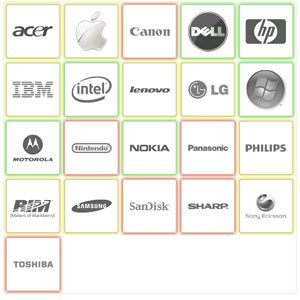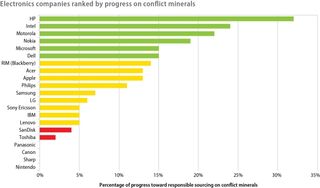HP, Intel, and Motorola Earn High Marks In Conflict Minerals Assesment Report

Two years ago, the Enough Project -- the non-profit organization behind the Raise Hope for Congo campaign -- reached out to 21 top consumer electronics companies regarding the serious problem of conflict minerals in the industry. Conflict minerals are similar to conflict diamonds: they're highly valued by companies and consumers, generate a lot of income for the entities that control the mines, and fuel deadly conflicts.
Tantalum, tungsten, tin, and gold can be found in every piece of electronics you own from your laptop to your handheld game console. Without them, there would be no wire, no chips, no battery life. Every electronics manufacturer depends on the mining of these minerals. Around 12 percent of the world's supply comes from the Democratic Republic of Congo, home to one of the deadliest conflicts in the world. Militia groups and even factions of the country's military control many mines and use the profits generated to wage war. Read our in-depth piece on Conflict Minerals for more information.
The Enough Project recognizes that one of the best ways to weaken the militias is to cut off their funding, so the organization set out to raise awareness of the issue with these top companies and track their progress toward making their supply chains conflict free. Two years on, they've published the data they collected in their first Assessment of Corporate Action [PDF] and posted the basic results on their website. The hope is that this data and these tools will help educate consumers about the companies whose products they purchase and help them take action that will lead to change.
The full report is a little long, but makes for an interesting read. This chart represents the culmination of the Enough Project's findings:

(click to enlarge)
Companies with longer progress bars have done more to tackle the conflict minerals issue, companies with shorter progress bars aren't so far along, and those at the bottom with no bars have done virtually nothing in the past two years. Though it's good to see so many companies near the top of the list, note that even HP (with the longest bar) is only around 33 percent of the way toward a conflict free supply chain. In other words: there's still a lot of work to do.
What did the companies at the top of the list do to earn their ratings? Several factors went into the rankings, but the most important revolves around actions taken. HP, Intel, Motorola, Nokia, Microsoft and Dell have played a key role in the industry working group to hammer out solutions to the problem of conflict minerals. Some have traced the source of minerals back through a labyrinthine supply chain, others lobbied congress to include a conflict minerals provision in a recently passed bill (while many companies lobbied against this), and some are even involved with lobbying legislators in other countries as well.
Stay in the know with Laptop Mag
Get our in-depth reviews, helpful tips, great deals, and the biggest news stories delivered to your inbox.
When looking over this study, one of the things we wondered was why these 21 companies were on the list and not others; Sony Electronics (only Sony Ericsson is there), Nvidia, Qualcomm, HTC and ASUS, to name a few. I spoke to the Enough Project's Policy Analyst Aaron Hall, and he told me that the criteria for choosing these 21 was multifold.
This undertaking started back in 2008, as I said, and the organization went by which companies had the largest market share and profits at the time. They also concentrated on certain types of companies: cell phone, laptops, MP3 players, gaming systems, etc. Another factor was that some companies were more willing than other to participate in the process.
Chip makers were left off the list, for the most part, in favor of companies that sold products directly to end users. However, due to Intel's leadership on the issue, plus the fact that they do make some consumer products, the organization felt they should be included. AMD also received a special shout-out for their excellent work.
The Enough Project hopes to make this assessment process a continual one -- revising the rankings, adding new companies, and raising more awareness. You can download the full report, which includes more details about the rankings, here in PDF form, or visit the Project's interactive ranking page for instructions on how to contact each company. Click here to read our in-depth exploration of the issues behind conflict minerals and how corporations, governments, and consumers can work to put an end to the strife.
